MGT301A Case Study: Unilever's Sustainability and Competitiveness
VerifiedAdded on 2023/05/28
|12
|2832
|115
Case Study
AI Summary
This case study delves into Unilever's sustainability challenges, particularly concerning the use of plastics in its products and the resulting environmental impact. It examines the stakeholder theory and analyzes Unilever's market operations, highlighting the conflict between profitability and sustainability. The study identifies alternative solutions, such as releasing new eco-friendly products, withdrawing products containing microbeads, and acquiring firms specializing in herbal and organic skincare. Recommendations emphasize the importance of using organic materials and sustainable practices to reduce environmental harm and strengthen brand management. The analysis concludes that sustainability can indeed boost profitability by enhancing brand value and attracting more environmentally conscious customers. Desklib provides access to similar case studies and study tools for students.
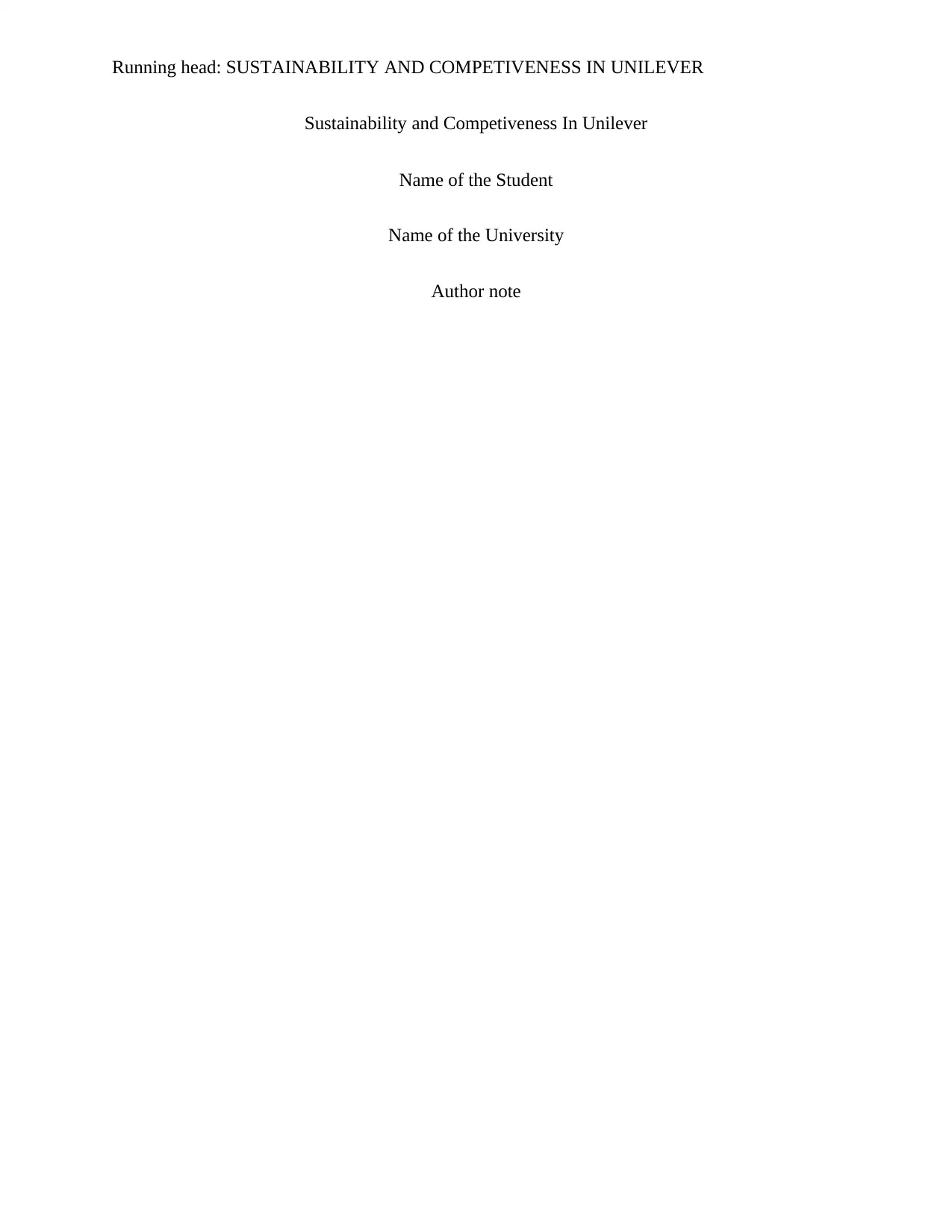
Running head: SUSTAINABILITY AND COMPETIVENESS IN UNILEVER
Sustainability and Competiveness In Unilever
Name of the Student
Name of the University
Author note
Sustainability and Competiveness In Unilever
Name of the Student
Name of the University
Author note
Paraphrase This Document
Need a fresh take? Get an instant paraphrase of this document with our AI Paraphraser
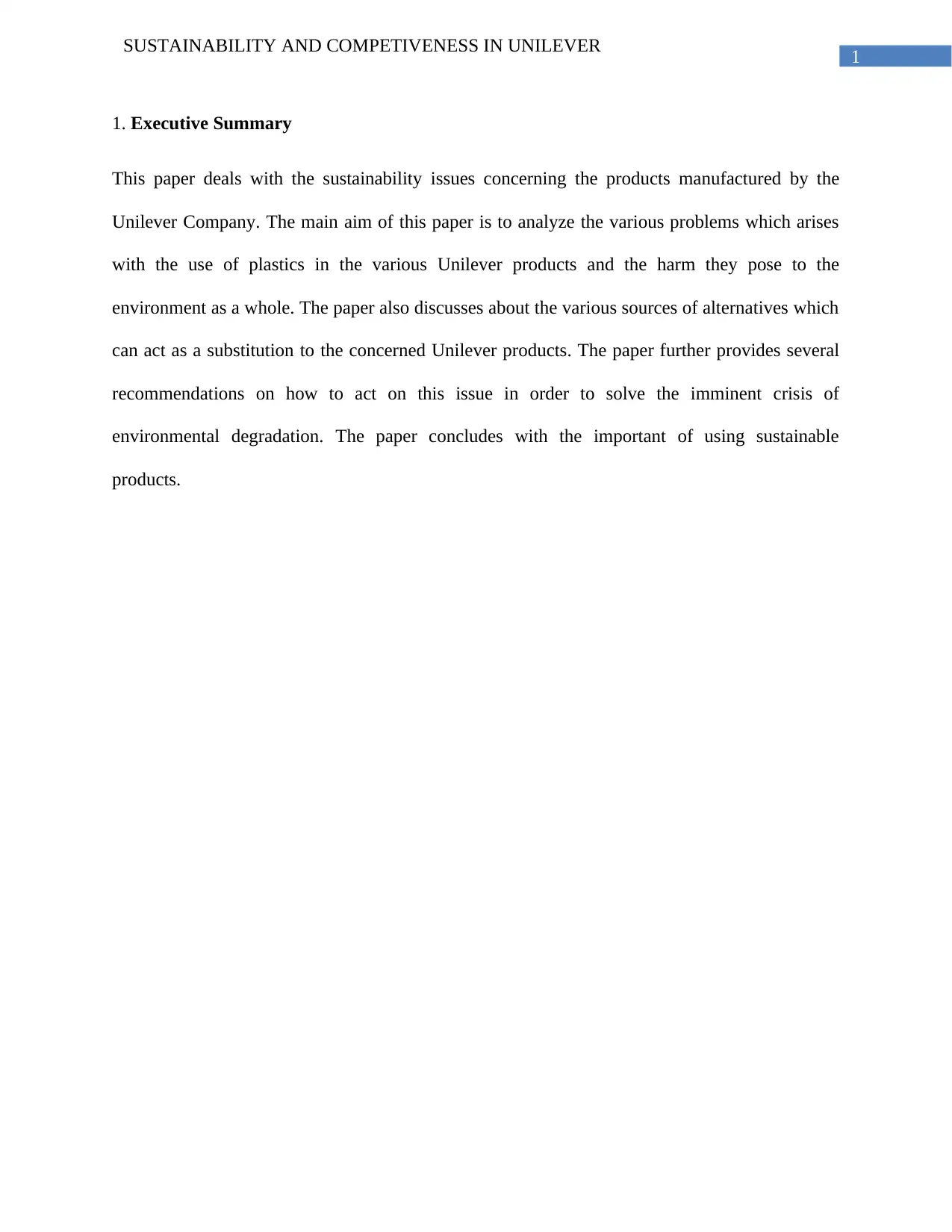
1
SUSTAINABILITY AND COMPETIVENESS IN UNILEVER
1. Executive Summary
This paper deals with the sustainability issues concerning the products manufactured by the
Unilever Company. The main aim of this paper is to analyze the various problems which arises
with the use of plastics in the various Unilever products and the harm they pose to the
environment as a whole. The paper also discusses about the various sources of alternatives which
can act as a substitution to the concerned Unilever products. The paper further provides several
recommendations on how to act on this issue in order to solve the imminent crisis of
environmental degradation. The paper concludes with the important of using sustainable
products.
SUSTAINABILITY AND COMPETIVENESS IN UNILEVER
1. Executive Summary
This paper deals with the sustainability issues concerning the products manufactured by the
Unilever Company. The main aim of this paper is to analyze the various problems which arises
with the use of plastics in the various Unilever products and the harm they pose to the
environment as a whole. The paper also discusses about the various sources of alternatives which
can act as a substitution to the concerned Unilever products. The paper further provides several
recommendations on how to act on this issue in order to solve the imminent crisis of
environmental degradation. The paper concludes with the important of using sustainable
products.
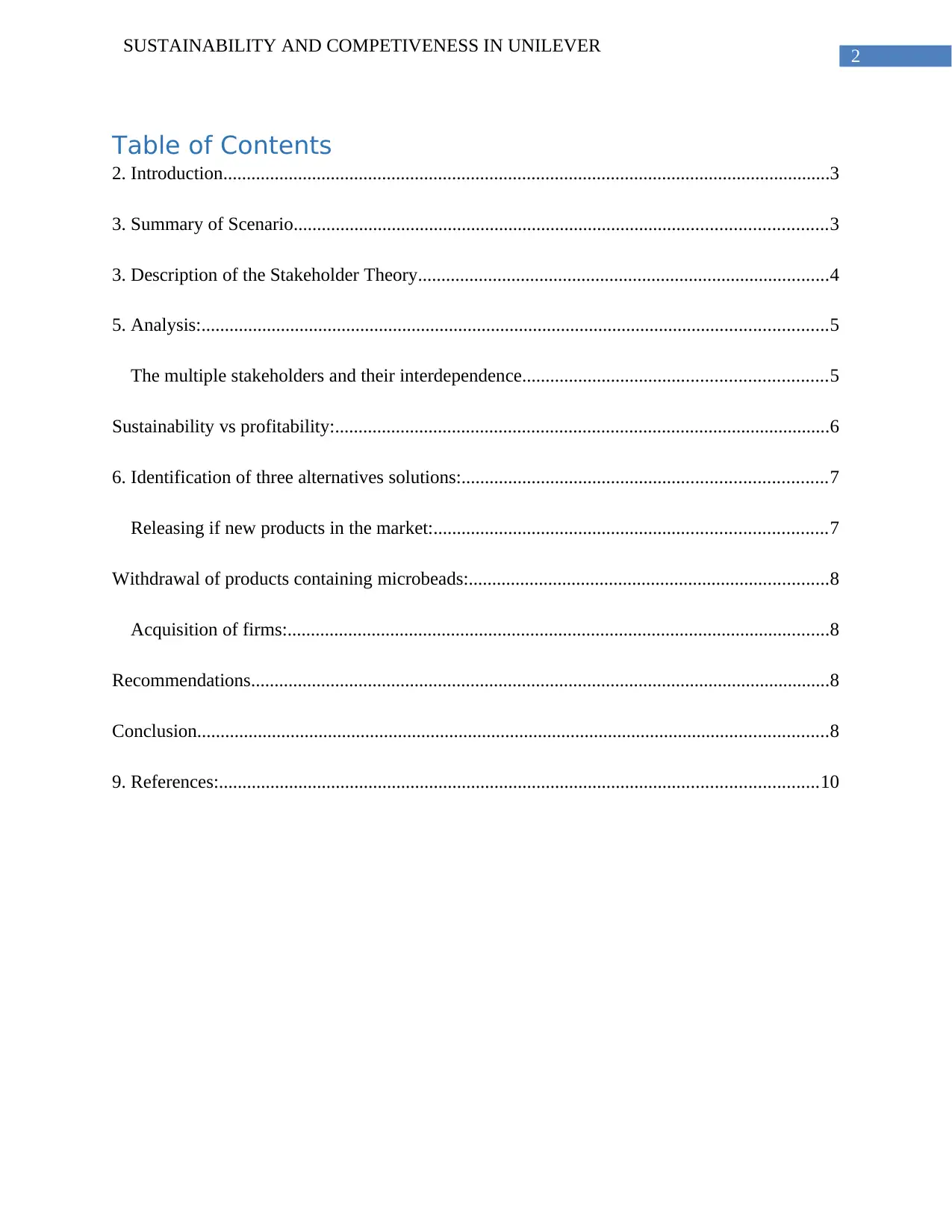
2
SUSTAINABILITY AND COMPETIVENESS IN UNILEVER
Table of Contents
2. Introduction..................................................................................................................................3
3. Summary of Scenario..................................................................................................................3
3. Description of the Stakeholder Theory........................................................................................4
5. Analysis:......................................................................................................................................5
The multiple stakeholders and their interdependence.................................................................5
Sustainability vs profitability:..........................................................................................................6
6. Identification of three alternatives solutions:..............................................................................7
Releasing if new products in the market:....................................................................................7
Withdrawal of products containing microbeads:.............................................................................8
Acquisition of firms:....................................................................................................................8
Recommendations............................................................................................................................8
Conclusion.......................................................................................................................................8
9. References:................................................................................................................................10
SUSTAINABILITY AND COMPETIVENESS IN UNILEVER
Table of Contents
2. Introduction..................................................................................................................................3
3. Summary of Scenario..................................................................................................................3
3. Description of the Stakeholder Theory........................................................................................4
5. Analysis:......................................................................................................................................5
The multiple stakeholders and their interdependence.................................................................5
Sustainability vs profitability:..........................................................................................................6
6. Identification of three alternatives solutions:..............................................................................7
Releasing if new products in the market:....................................................................................7
Withdrawal of products containing microbeads:.............................................................................8
Acquisition of firms:....................................................................................................................8
Recommendations............................................................................................................................8
Conclusion.......................................................................................................................................8
9. References:................................................................................................................................10
⊘ This is a preview!⊘
Do you want full access?
Subscribe today to unlock all pages.

Trusted by 1+ million students worldwide
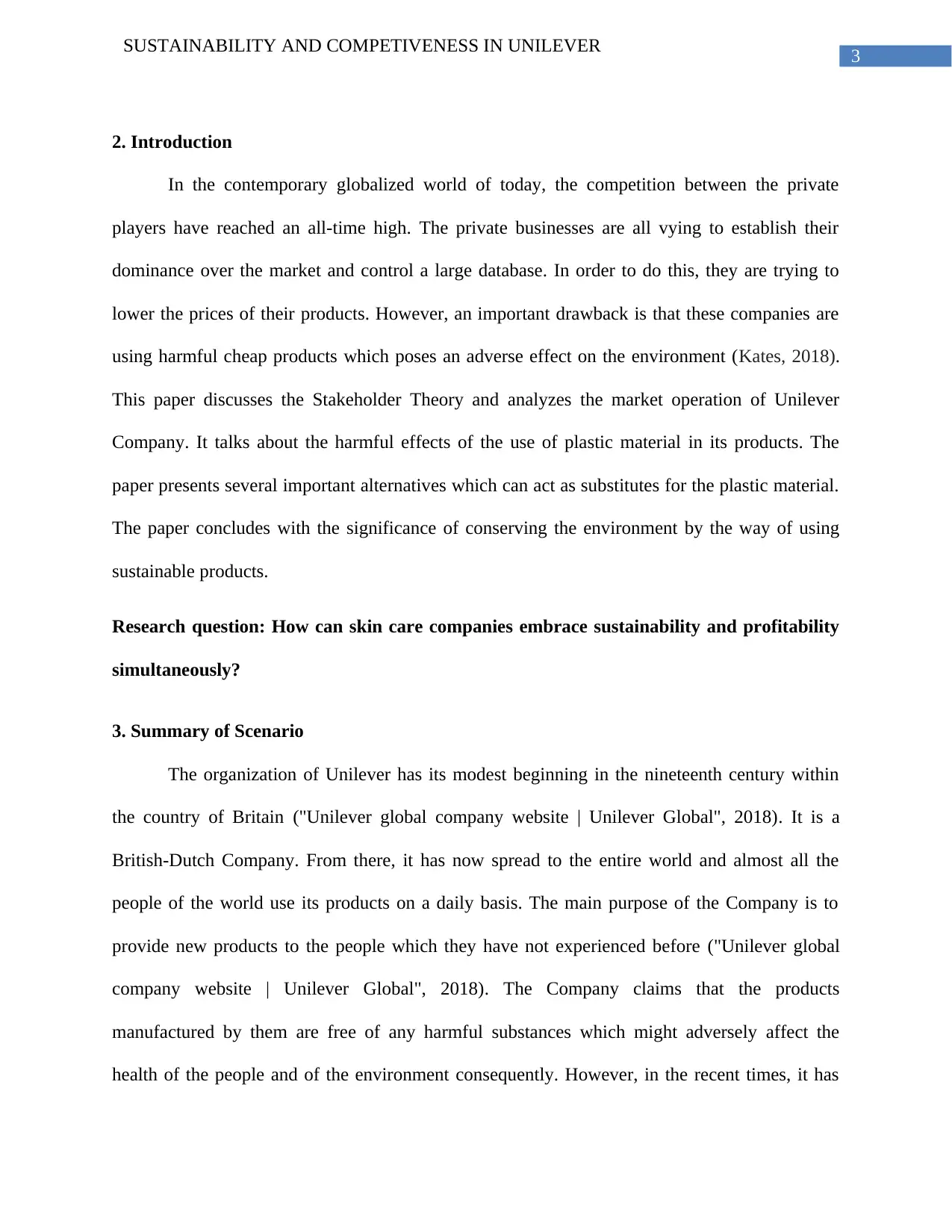
3
SUSTAINABILITY AND COMPETIVENESS IN UNILEVER
2. Introduction
In the contemporary globalized world of today, the competition between the private
players have reached an all-time high. The private businesses are all vying to establish their
dominance over the market and control a large database. In order to do this, they are trying to
lower the prices of their products. However, an important drawback is that these companies are
using harmful cheap products which poses an adverse effect on the environment (Kates, 2018).
This paper discusses the Stakeholder Theory and analyzes the market operation of Unilever
Company. It talks about the harmful effects of the use of plastic material in its products. The
paper presents several important alternatives which can act as substitutes for the plastic material.
The paper concludes with the significance of conserving the environment by the way of using
sustainable products.
Research question: How can skin care companies embrace sustainability and profitability
simultaneously?
3. Summary of Scenario
The organization of Unilever has its modest beginning in the nineteenth century within
the country of Britain ("Unilever global company website | Unilever Global", 2018). It is a
British-Dutch Company. From there, it has now spread to the entire world and almost all the
people of the world use its products on a daily basis. The main purpose of the Company is to
provide new products to the people which they have not experienced before ("Unilever global
company website | Unilever Global", 2018). The Company claims that the products
manufactured by them are free of any harmful substances which might adversely affect the
health of the people and of the environment consequently. However, in the recent times, it has
SUSTAINABILITY AND COMPETIVENESS IN UNILEVER
2. Introduction
In the contemporary globalized world of today, the competition between the private
players have reached an all-time high. The private businesses are all vying to establish their
dominance over the market and control a large database. In order to do this, they are trying to
lower the prices of their products. However, an important drawback is that these companies are
using harmful cheap products which poses an adverse effect on the environment (Kates, 2018).
This paper discusses the Stakeholder Theory and analyzes the market operation of Unilever
Company. It talks about the harmful effects of the use of plastic material in its products. The
paper presents several important alternatives which can act as substitutes for the plastic material.
The paper concludes with the significance of conserving the environment by the way of using
sustainable products.
Research question: How can skin care companies embrace sustainability and profitability
simultaneously?
3. Summary of Scenario
The organization of Unilever has its modest beginning in the nineteenth century within
the country of Britain ("Unilever global company website | Unilever Global", 2018). It is a
British-Dutch Company. From there, it has now spread to the entire world and almost all the
people of the world use its products on a daily basis. The main purpose of the Company is to
provide new products to the people which they have not experienced before ("Unilever global
company website | Unilever Global", 2018). The Company claims that the products
manufactured by them are free of any harmful substances which might adversely affect the
health of the people and of the environment consequently. However, in the recent times, it has
Paraphrase This Document
Need a fresh take? Get an instant paraphrase of this document with our AI Paraphraser
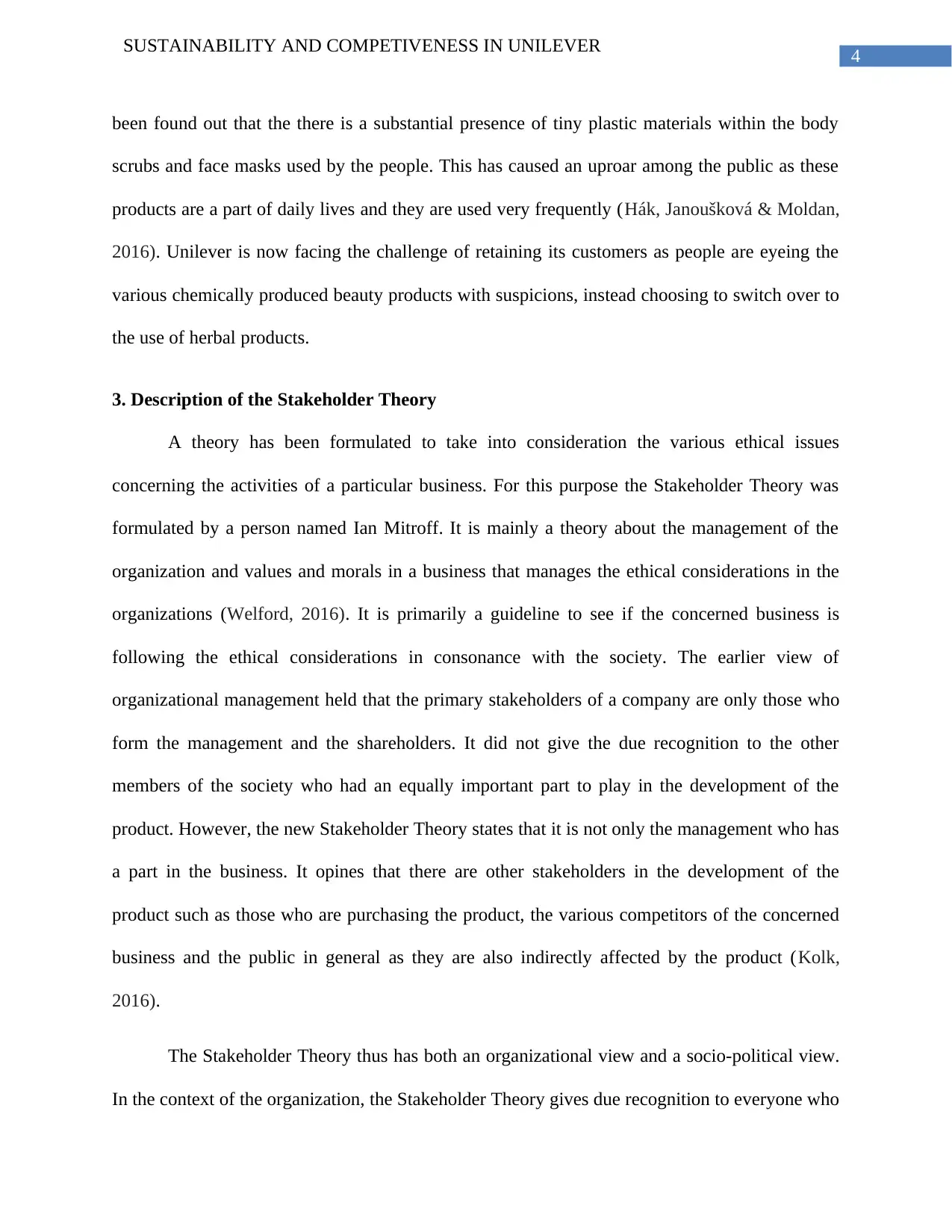
4
SUSTAINABILITY AND COMPETIVENESS IN UNILEVER
been found out that the there is a substantial presence of tiny plastic materials within the body
scrubs and face masks used by the people. This has caused an uproar among the public as these
products are a part of daily lives and they are used very frequently (Hák, Janoušková & Moldan,
2016). Unilever is now facing the challenge of retaining its customers as people are eyeing the
various chemically produced beauty products with suspicions, instead choosing to switch over to
the use of herbal products.
3. Description of the Stakeholder Theory
A theory has been formulated to take into consideration the various ethical issues
concerning the activities of a particular business. For this purpose the Stakeholder Theory was
formulated by a person named Ian Mitroff. It is mainly a theory about the management of the
organization and values and morals in a business that manages the ethical considerations in the
organizations (Welford, 2016). It is primarily a guideline to see if the concerned business is
following the ethical considerations in consonance with the society. The earlier view of
organizational management held that the primary stakeholders of a company are only those who
form the management and the shareholders. It did not give the due recognition to the other
members of the society who had an equally important part to play in the development of the
product. However, the new Stakeholder Theory states that it is not only the management who has
a part in the business. It opines that there are other stakeholders in the development of the
product such as those who are purchasing the product, the various competitors of the concerned
business and the public in general as they are also indirectly affected by the product (Kolk,
2016).
The Stakeholder Theory thus has both an organizational view and a socio-political view.
In the context of the organization, the Stakeholder Theory gives due recognition to everyone who
SUSTAINABILITY AND COMPETIVENESS IN UNILEVER
been found out that the there is a substantial presence of tiny plastic materials within the body
scrubs and face masks used by the people. This has caused an uproar among the public as these
products are a part of daily lives and they are used very frequently (Hák, Janoušková & Moldan,
2016). Unilever is now facing the challenge of retaining its customers as people are eyeing the
various chemically produced beauty products with suspicions, instead choosing to switch over to
the use of herbal products.
3. Description of the Stakeholder Theory
A theory has been formulated to take into consideration the various ethical issues
concerning the activities of a particular business. For this purpose the Stakeholder Theory was
formulated by a person named Ian Mitroff. It is mainly a theory about the management of the
organization and values and morals in a business that manages the ethical considerations in the
organizations (Welford, 2016). It is primarily a guideline to see if the concerned business is
following the ethical considerations in consonance with the society. The earlier view of
organizational management held that the primary stakeholders of a company are only those who
form the management and the shareholders. It did not give the due recognition to the other
members of the society who had an equally important part to play in the development of the
product. However, the new Stakeholder Theory states that it is not only the management who has
a part in the business. It opines that there are other stakeholders in the development of the
product such as those who are purchasing the product, the various competitors of the concerned
business and the public in general as they are also indirectly affected by the product (Kolk,
2016).
The Stakeholder Theory thus has both an organizational view and a socio-political view.
In the context of the organization, the Stakeholder Theory gives due recognition to everyone who
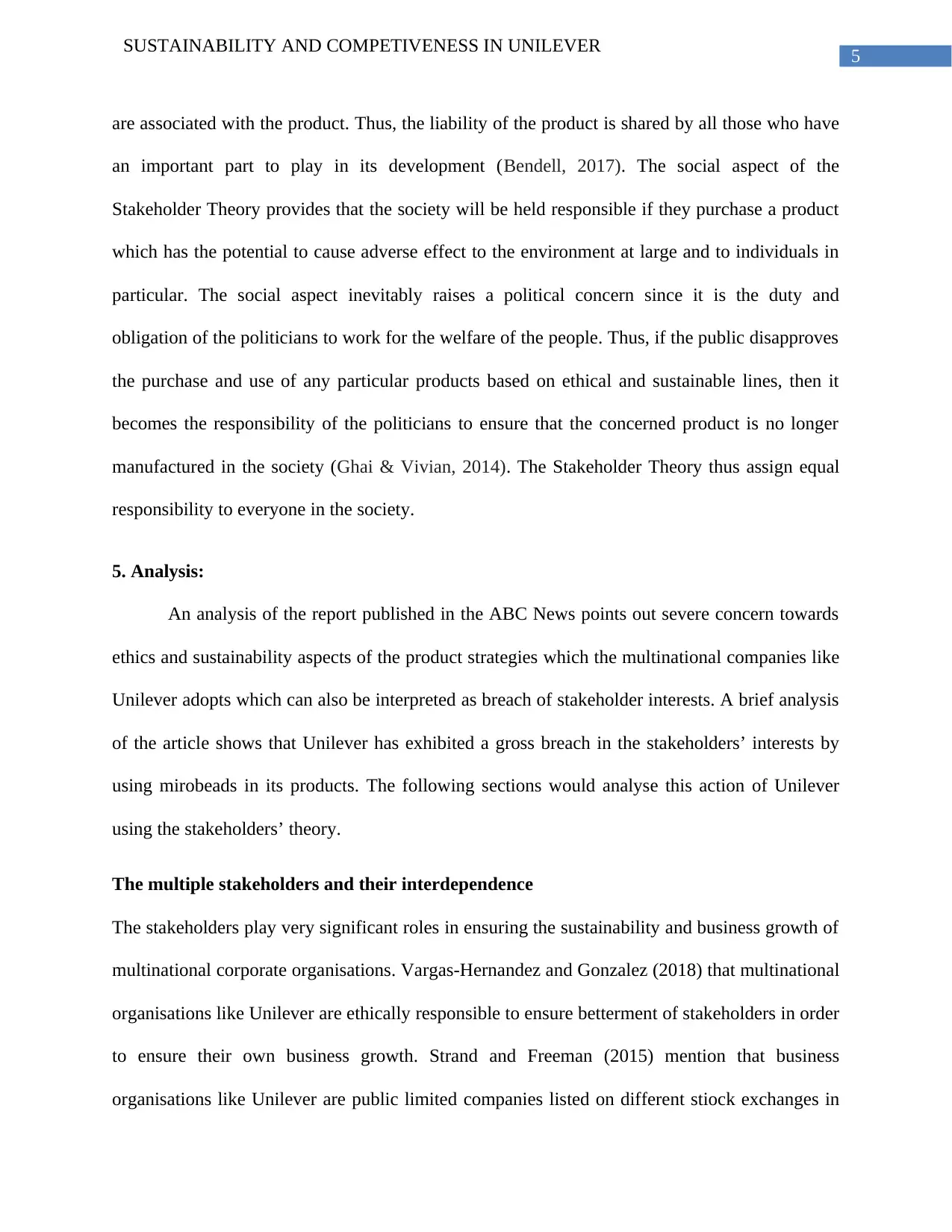
5
SUSTAINABILITY AND COMPETIVENESS IN UNILEVER
are associated with the product. Thus, the liability of the product is shared by all those who have
an important part to play in its development (Bendell, 2017). The social aspect of the
Stakeholder Theory provides that the society will be held responsible if they purchase a product
which has the potential to cause adverse effect to the environment at large and to individuals in
particular. The social aspect inevitably raises a political concern since it is the duty and
obligation of the politicians to work for the welfare of the people. Thus, if the public disapproves
the purchase and use of any particular products based on ethical and sustainable lines, then it
becomes the responsibility of the politicians to ensure that the concerned product is no longer
manufactured in the society (Ghai & Vivian, 2014). The Stakeholder Theory thus assign equal
responsibility to everyone in the society.
5. Analysis:
An analysis of the report published in the ABC News points out severe concern towards
ethics and sustainability aspects of the product strategies which the multinational companies like
Unilever adopts which can also be interpreted as breach of stakeholder interests. A brief analysis
of the article shows that Unilever has exhibited a gross breach in the stakeholders’ interests by
using mirobeads in its products. The following sections would analyse this action of Unilever
using the stakeholders’ theory.
The multiple stakeholders and their interdependence
The stakeholders play very significant roles in ensuring the sustainability and business growth of
multinational corporate organisations. Vargas-Hernandez and Gonzalez (2018) that multinational
organisations like Unilever are ethically responsible to ensure betterment of stakeholders in order
to ensure their own business growth. Strand and Freeman (2015) mention that business
organisations like Unilever are public limited companies listed on different stiock exchanges in
SUSTAINABILITY AND COMPETIVENESS IN UNILEVER
are associated with the product. Thus, the liability of the product is shared by all those who have
an important part to play in its development (Bendell, 2017). The social aspect of the
Stakeholder Theory provides that the society will be held responsible if they purchase a product
which has the potential to cause adverse effect to the environment at large and to individuals in
particular. The social aspect inevitably raises a political concern since it is the duty and
obligation of the politicians to work for the welfare of the people. Thus, if the public disapproves
the purchase and use of any particular products based on ethical and sustainable lines, then it
becomes the responsibility of the politicians to ensure that the concerned product is no longer
manufactured in the society (Ghai & Vivian, 2014). The Stakeholder Theory thus assign equal
responsibility to everyone in the society.
5. Analysis:
An analysis of the report published in the ABC News points out severe concern towards
ethics and sustainability aspects of the product strategies which the multinational companies like
Unilever adopts which can also be interpreted as breach of stakeholder interests. A brief analysis
of the article shows that Unilever has exhibited a gross breach in the stakeholders’ interests by
using mirobeads in its products. The following sections would analyse this action of Unilever
using the stakeholders’ theory.
The multiple stakeholders and their interdependence
The stakeholders play very significant roles in ensuring the sustainability and business growth of
multinational corporate organisations. Vargas-Hernandez and Gonzalez (2018) that multinational
organisations like Unilever are ethically responsible to ensure betterment of stakeholders in order
to ensure their own business growth. Strand and Freeman (2015) mention that business
organisations like Unilever are public limited companies listed on different stiock exchanges in
⊘ This is a preview!⊘
Do you want full access?
Subscribe today to unlock all pages.

Trusted by 1+ million students worldwide
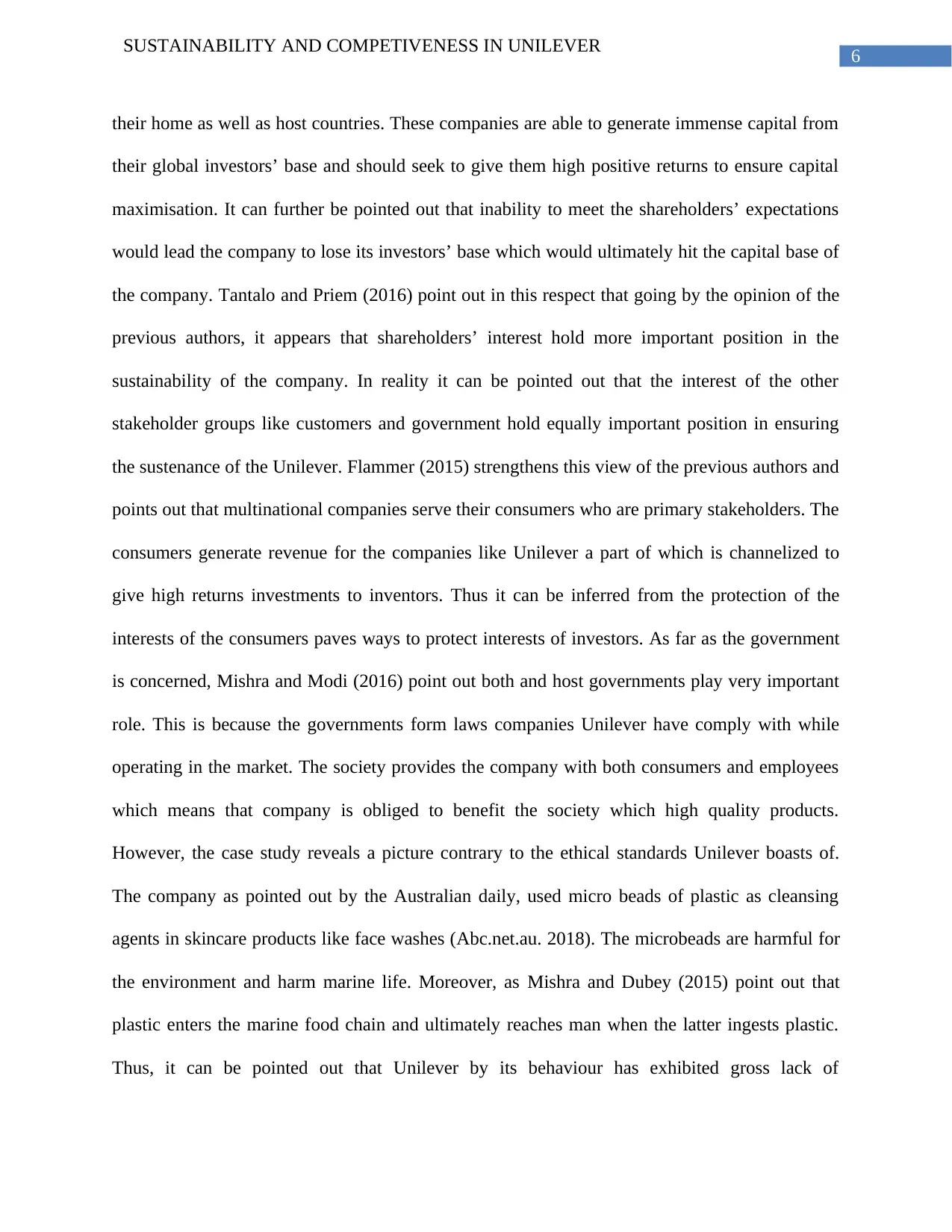
6
SUSTAINABILITY AND COMPETIVENESS IN UNILEVER
their home as well as host countries. These companies are able to generate immense capital from
their global investors’ base and should seek to give them high positive returns to ensure capital
maximisation. It can further be pointed out that inability to meet the shareholders’ expectations
would lead the company to lose its investors’ base which would ultimately hit the capital base of
the company. Tantalo and Priem (2016) point out in this respect that going by the opinion of the
previous authors, it appears that shareholders’ interest hold more important position in the
sustainability of the company. In reality it can be pointed out that the interest of the other
stakeholder groups like customers and government hold equally important position in ensuring
the sustenance of the Unilever. Flammer (2015) strengthens this view of the previous authors and
points out that multinational companies serve their consumers who are primary stakeholders. The
consumers generate revenue for the companies like Unilever a part of which is channelized to
give high returns investments to inventors. Thus it can be inferred from the protection of the
interests of the consumers paves ways to protect interests of investors. As far as the government
is concerned, Mishra and Modi (2016) point out both and host governments play very important
role. This is because the governments form laws companies Unilever have comply with while
operating in the market. The society provides the company with both consumers and employees
which means that company is obliged to benefit the society which high quality products.
However, the case study reveals a picture contrary to the ethical standards Unilever boasts of.
The company as pointed out by the Australian daily, used micro beads of plastic as cleansing
agents in skincare products like face washes (Abc.net.au. 2018). The microbeads are harmful for
the environment and harm marine life. Moreover, as Mishra and Dubey (2015) point out that
plastic enters the marine food chain and ultimately reaches man when the latter ingests plastic.
Thus, it can be pointed out that Unilever by its behaviour has exhibited gross lack of
SUSTAINABILITY AND COMPETIVENESS IN UNILEVER
their home as well as host countries. These companies are able to generate immense capital from
their global investors’ base and should seek to give them high positive returns to ensure capital
maximisation. It can further be pointed out that inability to meet the shareholders’ expectations
would lead the company to lose its investors’ base which would ultimately hit the capital base of
the company. Tantalo and Priem (2016) point out in this respect that going by the opinion of the
previous authors, it appears that shareholders’ interest hold more important position in the
sustainability of the company. In reality it can be pointed out that the interest of the other
stakeholder groups like customers and government hold equally important position in ensuring
the sustenance of the Unilever. Flammer (2015) strengthens this view of the previous authors and
points out that multinational companies serve their consumers who are primary stakeholders. The
consumers generate revenue for the companies like Unilever a part of which is channelized to
give high returns investments to inventors. Thus it can be inferred from the protection of the
interests of the consumers paves ways to protect interests of investors. As far as the government
is concerned, Mishra and Modi (2016) point out both and host governments play very important
role. This is because the governments form laws companies Unilever have comply with while
operating in the market. The society provides the company with both consumers and employees
which means that company is obliged to benefit the society which high quality products.
However, the case study reveals a picture contrary to the ethical standards Unilever boasts of.
The company as pointed out by the Australian daily, used micro beads of plastic as cleansing
agents in skincare products like face washes (Abc.net.au. 2018). The microbeads are harmful for
the environment and harm marine life. Moreover, as Mishra and Dubey (2015) point out that
plastic enters the marine food chain and ultimately reaches man when the latter ingests plastic.
Thus, it can be pointed out that Unilever by its behaviour has exhibited gross lack of
Paraphrase This Document
Need a fresh take? Get an instant paraphrase of this document with our AI Paraphraser
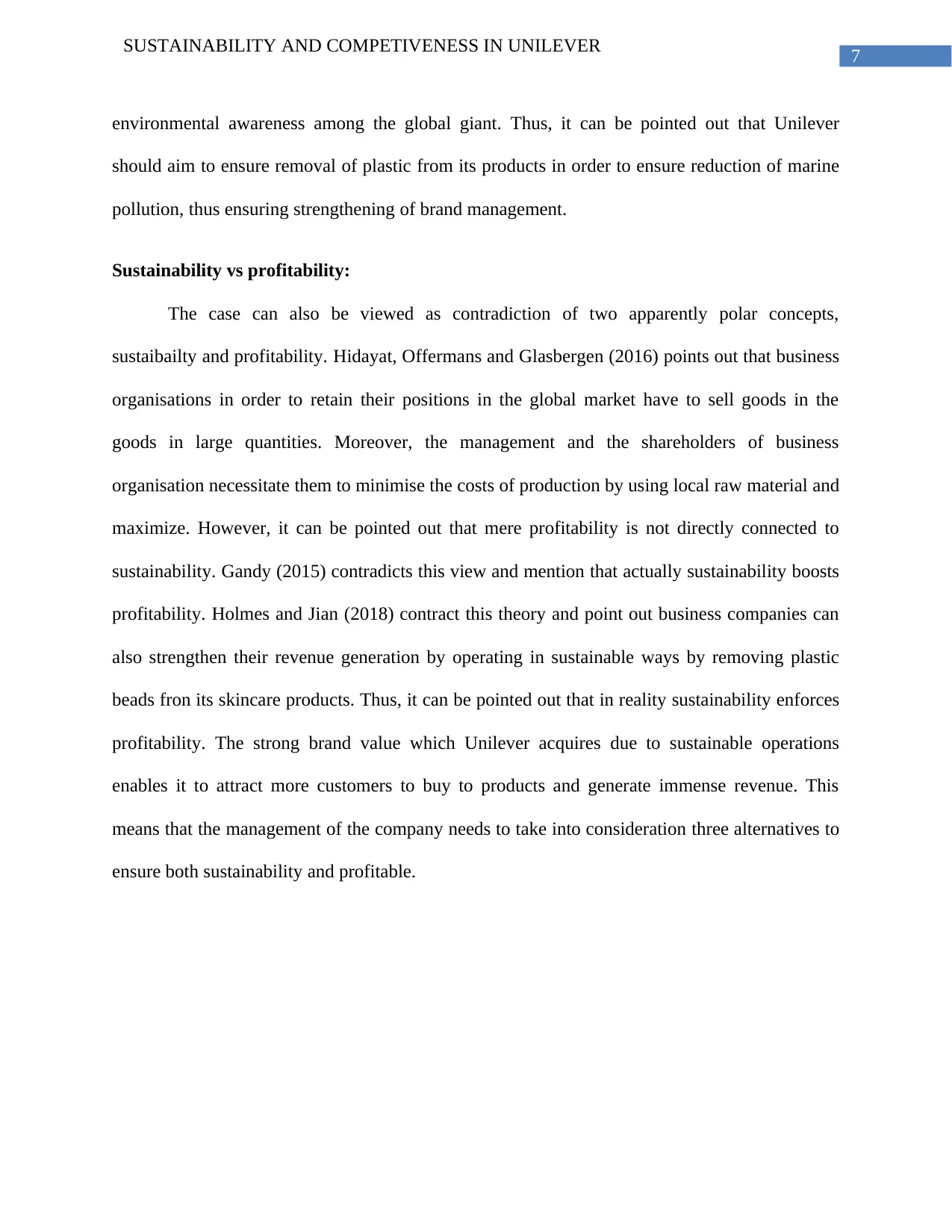
7
SUSTAINABILITY AND COMPETIVENESS IN UNILEVER
environmental awareness among the global giant. Thus, it can be pointed out that Unilever
should aim to ensure removal of plastic from its products in order to ensure reduction of marine
pollution, thus ensuring strengthening of brand management.
Sustainability vs profitability:
The case can also be viewed as contradiction of two apparently polar concepts,
sustaibailty and profitability. Hidayat, Offermans and Glasbergen (2016) points out that business
organisations in order to retain their positions in the global market have to sell goods in the
goods in large quantities. Moreover, the management and the shareholders of business
organisation necessitate them to minimise the costs of production by using local raw material and
maximize. However, it can be pointed out that mere profitability is not directly connected to
sustainability. Gandy (2015) contradicts this view and mention that actually sustainability boosts
profitability. Holmes and Jian (2018) contract this theory and point out business companies can
also strengthen their revenue generation by operating in sustainable ways by removing plastic
beads fron its skincare products. Thus, it can be pointed out that in reality sustainability enforces
profitability. The strong brand value which Unilever acquires due to sustainable operations
enables it to attract more customers to buy to products and generate immense revenue. This
means that the management of the company needs to take into consideration three alternatives to
ensure both sustainability and profitable.
SUSTAINABILITY AND COMPETIVENESS IN UNILEVER
environmental awareness among the global giant. Thus, it can be pointed out that Unilever
should aim to ensure removal of plastic from its products in order to ensure reduction of marine
pollution, thus ensuring strengthening of brand management.
Sustainability vs profitability:
The case can also be viewed as contradiction of two apparently polar concepts,
sustaibailty and profitability. Hidayat, Offermans and Glasbergen (2016) points out that business
organisations in order to retain their positions in the global market have to sell goods in the
goods in large quantities. Moreover, the management and the shareholders of business
organisation necessitate them to minimise the costs of production by using local raw material and
maximize. However, it can be pointed out that mere profitability is not directly connected to
sustainability. Gandy (2015) contradicts this view and mention that actually sustainability boosts
profitability. Holmes and Jian (2018) contract this theory and point out business companies can
also strengthen their revenue generation by operating in sustainable ways by removing plastic
beads fron its skincare products. Thus, it can be pointed out that in reality sustainability enforces
profitability. The strong brand value which Unilever acquires due to sustainable operations
enables it to attract more customers to buy to products and generate immense revenue. This
means that the management of the company needs to take into consideration three alternatives to
ensure both sustainability and profitable.
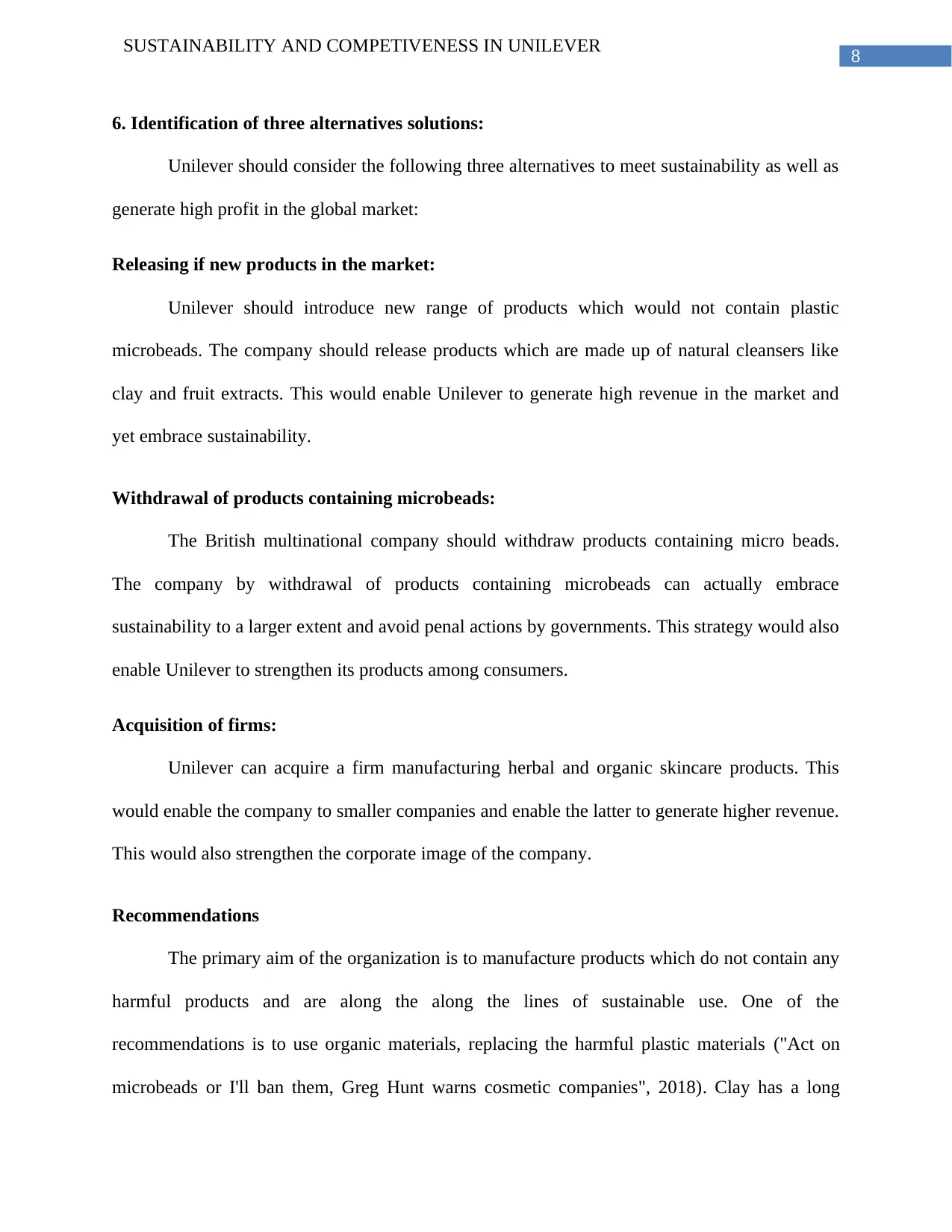
8
SUSTAINABILITY AND COMPETIVENESS IN UNILEVER
6. Identification of three alternatives solutions:
Unilever should consider the following three alternatives to meet sustainability as well as
generate high profit in the global market:
Releasing if new products in the market:
Unilever should introduce new range of products which would not contain plastic
microbeads. The company should release products which are made up of natural cleansers like
clay and fruit extracts. This would enable Unilever to generate high revenue in the market and
yet embrace sustainability.
Withdrawal of products containing microbeads:
The British multinational company should withdraw products containing micro beads.
The company by withdrawal of products containing microbeads can actually embrace
sustainability to a larger extent and avoid penal actions by governments. This strategy would also
enable Unilever to strengthen its products among consumers.
Acquisition of firms:
Unilever can acquire a firm manufacturing herbal and organic skincare products. This
would enable the company to smaller companies and enable the latter to generate higher revenue.
This would also strengthen the corporate image of the company.
Recommendations
The primary aim of the organization is to manufacture products which do not contain any
harmful products and are along the along the lines of sustainable use. One of the
recommendations is to use organic materials, replacing the harmful plastic materials ("Act on
microbeads or I'll ban them, Greg Hunt warns cosmetic companies", 2018). Clay has a long
SUSTAINABILITY AND COMPETIVENESS IN UNILEVER
6. Identification of three alternatives solutions:
Unilever should consider the following three alternatives to meet sustainability as well as
generate high profit in the global market:
Releasing if new products in the market:
Unilever should introduce new range of products which would not contain plastic
microbeads. The company should release products which are made up of natural cleansers like
clay and fruit extracts. This would enable Unilever to generate high revenue in the market and
yet embrace sustainability.
Withdrawal of products containing microbeads:
The British multinational company should withdraw products containing micro beads.
The company by withdrawal of products containing microbeads can actually embrace
sustainability to a larger extent and avoid penal actions by governments. This strategy would also
enable Unilever to strengthen its products among consumers.
Acquisition of firms:
Unilever can acquire a firm manufacturing herbal and organic skincare products. This
would enable the company to smaller companies and enable the latter to generate higher revenue.
This would also strengthen the corporate image of the company.
Recommendations
The primary aim of the organization is to manufacture products which do not contain any
harmful products and are along the along the lines of sustainable use. One of the
recommendations is to use organic materials, replacing the harmful plastic materials ("Act on
microbeads or I'll ban them, Greg Hunt warns cosmetic companies", 2018). Clay has a long
⊘ This is a preview!⊘
Do you want full access?
Subscribe today to unlock all pages.

Trusted by 1+ million students worldwide
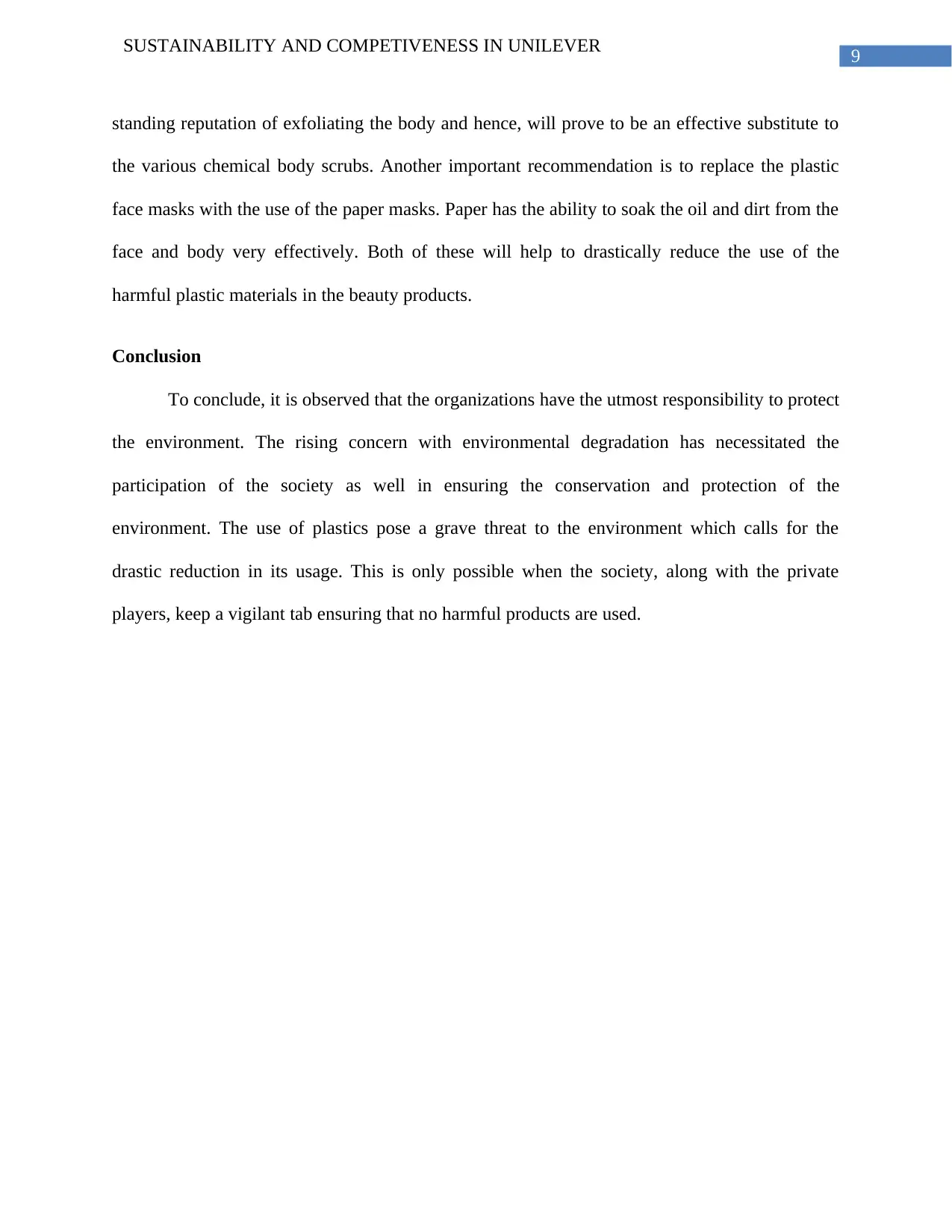
9
SUSTAINABILITY AND COMPETIVENESS IN UNILEVER
standing reputation of exfoliating the body and hence, will prove to be an effective substitute to
the various chemical body scrubs. Another important recommendation is to replace the plastic
face masks with the use of the paper masks. Paper has the ability to soak the oil and dirt from the
face and body very effectively. Both of these will help to drastically reduce the use of the
harmful plastic materials in the beauty products.
Conclusion
To conclude, it is observed that the organizations have the utmost responsibility to protect
the environment. The rising concern with environmental degradation has necessitated the
participation of the society as well in ensuring the conservation and protection of the
environment. The use of plastics pose a grave threat to the environment which calls for the
drastic reduction in its usage. This is only possible when the society, along with the private
players, keep a vigilant tab ensuring that no harmful products are used.
SUSTAINABILITY AND COMPETIVENESS IN UNILEVER
standing reputation of exfoliating the body and hence, will prove to be an effective substitute to
the various chemical body scrubs. Another important recommendation is to replace the plastic
face masks with the use of the paper masks. Paper has the ability to soak the oil and dirt from the
face and body very effectively. Both of these will help to drastically reduce the use of the
harmful plastic materials in the beauty products.
Conclusion
To conclude, it is observed that the organizations have the utmost responsibility to protect
the environment. The rising concern with environmental degradation has necessitated the
participation of the society as well in ensuring the conservation and protection of the
environment. The use of plastics pose a grave threat to the environment which calls for the
drastic reduction in its usage. This is only possible when the society, along with the private
players, keep a vigilant tab ensuring that no harmful products are used.
Paraphrase This Document
Need a fresh take? Get an instant paraphrase of this document with our AI Paraphraser
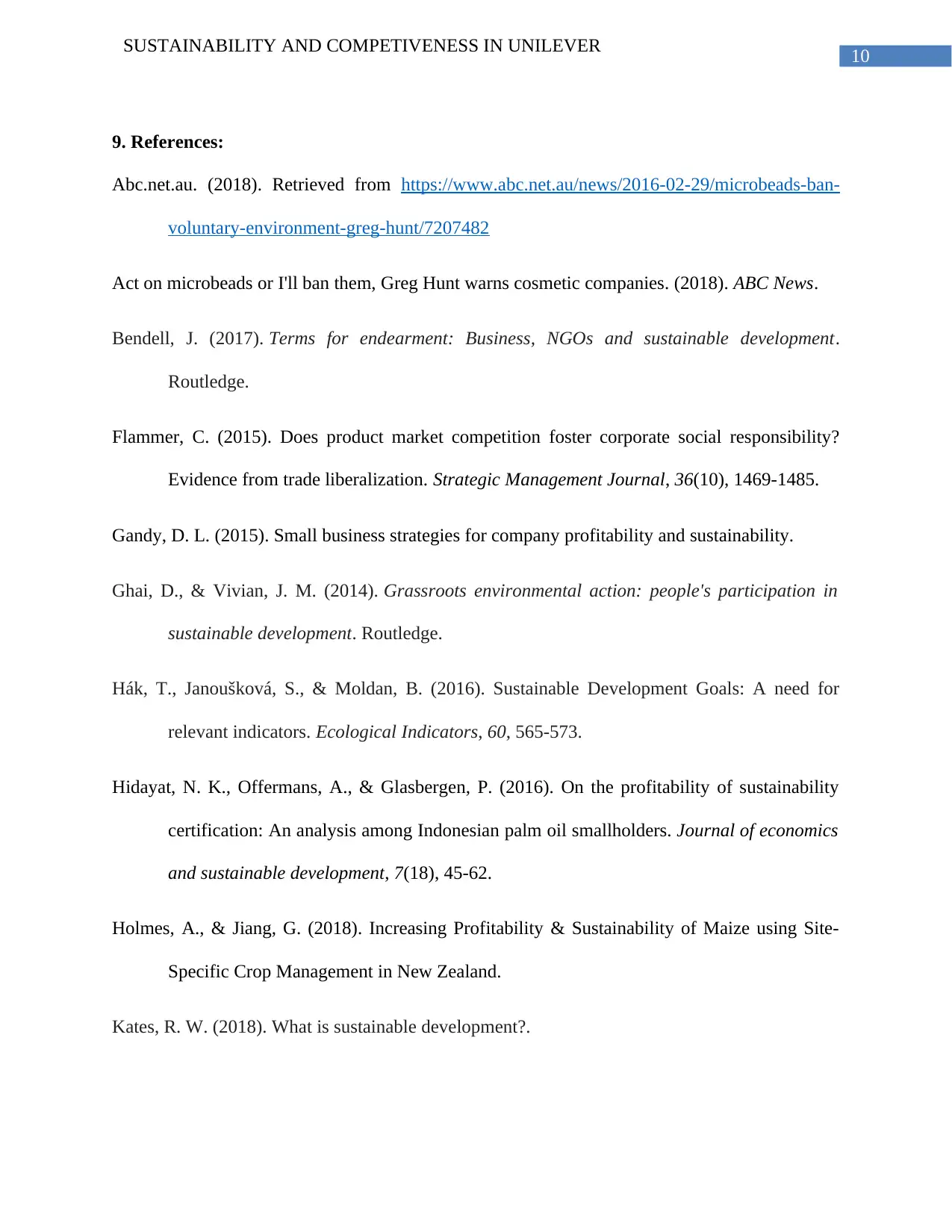
10
SUSTAINABILITY AND COMPETIVENESS IN UNILEVER
9. References:
Abc.net.au. (2018). Retrieved from https://www.abc.net.au/news/2016-02-29/microbeads-ban-
voluntary-environment-greg-hunt/7207482
Act on microbeads or I'll ban them, Greg Hunt warns cosmetic companies. (2018). ABC News.
Bendell, J. (2017). Terms for endearment: Business, NGOs and sustainable development.
Routledge.
Flammer, C. (2015). Does product market competition foster corporate social responsibility?
Evidence from trade liberalization. Strategic Management Journal, 36(10), 1469-1485.
Gandy, D. L. (2015). Small business strategies for company profitability and sustainability.
Ghai, D., & Vivian, J. M. (2014). Grassroots environmental action: people's participation in
sustainable development. Routledge.
Hák, T., Janoušková, S., & Moldan, B. (2016). Sustainable Development Goals: A need for
relevant indicators. Ecological Indicators, 60, 565-573.
Hidayat, N. K., Offermans, A., & Glasbergen, P. (2016). On the profitability of sustainability
certification: An analysis among Indonesian palm oil smallholders. Journal of economics
and sustainable development, 7(18), 45-62.
Holmes, A., & Jiang, G. (2018). Increasing Profitability & Sustainability of Maize using Site-
Specific Crop Management in New Zealand.
Kates, R. W. (2018). What is sustainable development?.
SUSTAINABILITY AND COMPETIVENESS IN UNILEVER
9. References:
Abc.net.au. (2018). Retrieved from https://www.abc.net.au/news/2016-02-29/microbeads-ban-
voluntary-environment-greg-hunt/7207482
Act on microbeads or I'll ban them, Greg Hunt warns cosmetic companies. (2018). ABC News.
Bendell, J. (2017). Terms for endearment: Business, NGOs and sustainable development.
Routledge.
Flammer, C. (2015). Does product market competition foster corporate social responsibility?
Evidence from trade liberalization. Strategic Management Journal, 36(10), 1469-1485.
Gandy, D. L. (2015). Small business strategies for company profitability and sustainability.
Ghai, D., & Vivian, J. M. (2014). Grassroots environmental action: people's participation in
sustainable development. Routledge.
Hák, T., Janoušková, S., & Moldan, B. (2016). Sustainable Development Goals: A need for
relevant indicators. Ecological Indicators, 60, 565-573.
Hidayat, N. K., Offermans, A., & Glasbergen, P. (2016). On the profitability of sustainability
certification: An analysis among Indonesian palm oil smallholders. Journal of economics
and sustainable development, 7(18), 45-62.
Holmes, A., & Jiang, G. (2018). Increasing Profitability & Sustainability of Maize using Site-
Specific Crop Management in New Zealand.
Kates, R. W. (2018). What is sustainable development?.
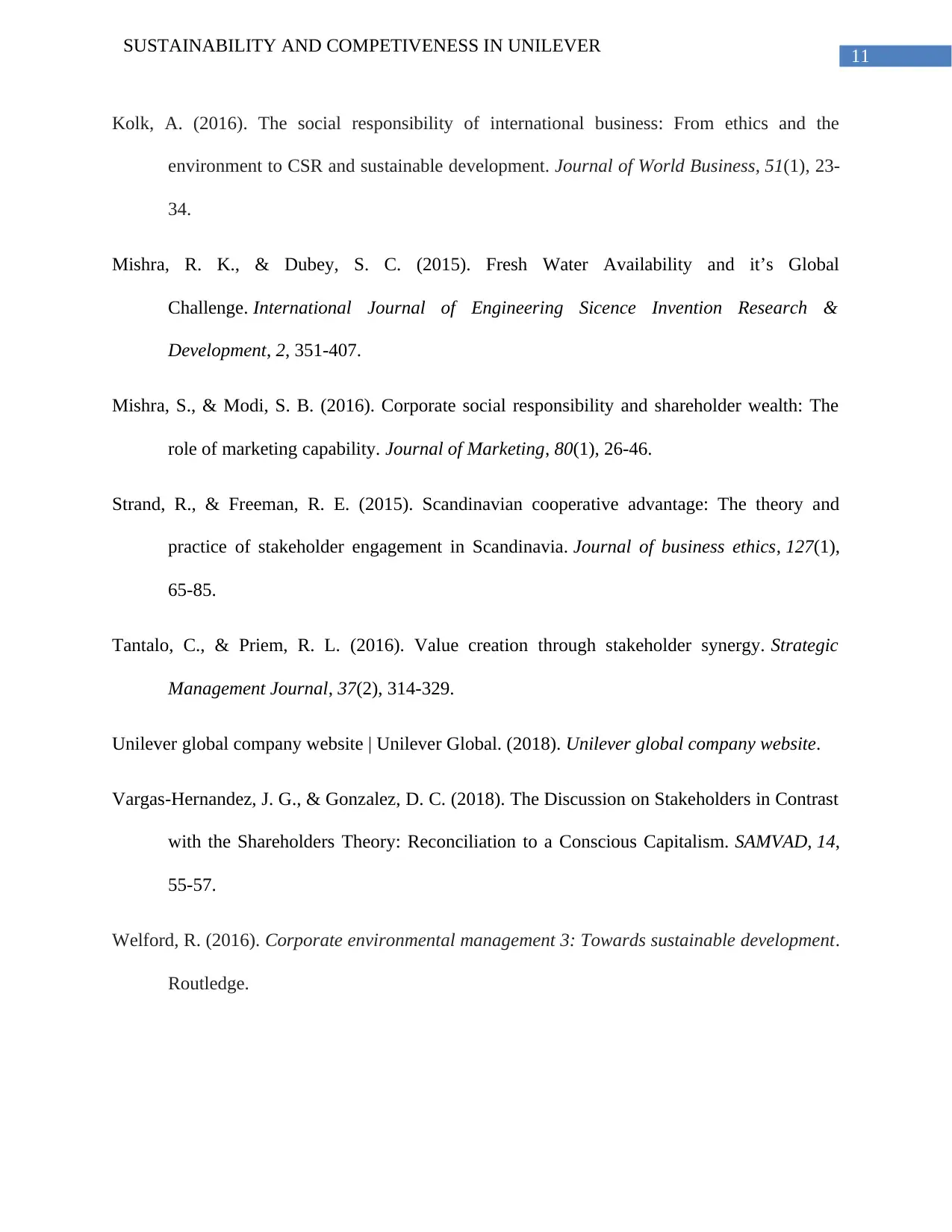
11
SUSTAINABILITY AND COMPETIVENESS IN UNILEVER
Kolk, A. (2016). The social responsibility of international business: From ethics and the
environment to CSR and sustainable development. Journal of World Business, 51(1), 23-
34.
Mishra, R. K., & Dubey, S. C. (2015). Fresh Water Availability and it’s Global
Challenge. International Journal of Engineering Sicence Invention Research &
Development, 2, 351-407.
Mishra, S., & Modi, S. B. (2016). Corporate social responsibility and shareholder wealth: The
role of marketing capability. Journal of Marketing, 80(1), 26-46.
Strand, R., & Freeman, R. E. (2015). Scandinavian cooperative advantage: The theory and
practice of stakeholder engagement in Scandinavia. Journal of business ethics, 127(1),
65-85.
Tantalo, C., & Priem, R. L. (2016). Value creation through stakeholder synergy. Strategic
Management Journal, 37(2), 314-329.
Unilever global company website | Unilever Global. (2018). Unilever global company website.
Vargas-Hernandez, J. G., & Gonzalez, D. C. (2018). The Discussion on Stakeholders in Contrast
with the Shareholders Theory: Reconciliation to a Conscious Capitalism. SAMVAD, 14,
55-57.
Welford, R. (2016). Corporate environmental management 3: Towards sustainable development.
Routledge.
SUSTAINABILITY AND COMPETIVENESS IN UNILEVER
Kolk, A. (2016). The social responsibility of international business: From ethics and the
environment to CSR and sustainable development. Journal of World Business, 51(1), 23-
34.
Mishra, R. K., & Dubey, S. C. (2015). Fresh Water Availability and it’s Global
Challenge. International Journal of Engineering Sicence Invention Research &
Development, 2, 351-407.
Mishra, S., & Modi, S. B. (2016). Corporate social responsibility and shareholder wealth: The
role of marketing capability. Journal of Marketing, 80(1), 26-46.
Strand, R., & Freeman, R. E. (2015). Scandinavian cooperative advantage: The theory and
practice of stakeholder engagement in Scandinavia. Journal of business ethics, 127(1),
65-85.
Tantalo, C., & Priem, R. L. (2016). Value creation through stakeholder synergy. Strategic
Management Journal, 37(2), 314-329.
Unilever global company website | Unilever Global. (2018). Unilever global company website.
Vargas-Hernandez, J. G., & Gonzalez, D. C. (2018). The Discussion on Stakeholders in Contrast
with the Shareholders Theory: Reconciliation to a Conscious Capitalism. SAMVAD, 14,
55-57.
Welford, R. (2016). Corporate environmental management 3: Towards sustainable development.
Routledge.
⊘ This is a preview!⊘
Do you want full access?
Subscribe today to unlock all pages.

Trusted by 1+ million students worldwide
1 out of 12
Related Documents
Your All-in-One AI-Powered Toolkit for Academic Success.
+13062052269
info@desklib.com
Available 24*7 on WhatsApp / Email
![[object Object]](/_next/static/media/star-bottom.7253800d.svg)
Unlock your academic potential
Copyright © 2020–2025 A2Z Services. All Rights Reserved. Developed and managed by ZUCOL.





